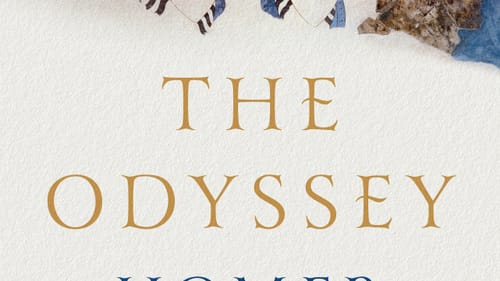Stay in the Loop
BSR publishes on a weekly schedule, with an email newsletter every Wednesday and Thursday morning. There’s no paywall, and subscribing is always free.
Odysseus returns
Emily Wilson's new translation of Homer's 'The Odyssey'

On page 476 of Emily Wilson’s new translation of Homer’s ancient epic The Odyssey, in a chapter titled “Bloodshed,” Odysseus clinches his Clint Eastwood moment.
Odysseus stops being polite
He’s had a lengthy absence from home — a decade fighting the Trojan War and another 10 years of sea-tossed wandering. Upon his return, Odysseus faces off against the arrogant young suitors who have been using his palace as a party house: swilling his wine, wooing his steadfast wife, Penelope, and threatening his son, Telemachus.
Since washing up on Ithaca’s shore, Odysseus (thanks to the astute and magical Athena) has been disguised as an old, stooped beggar. But that is about to change:
Odysseus ripped off his rags. Now naked,
he leapt upon the threshold with his bow
and quiver full of arrows, which he tipped
out in a rush before his feet and spoke.
“Playtime is over…”
I was at the wheel of my Honda Fit. My partner, Elissa, had been reading aloud for miles as we motored across Tennessee, the homebound leg of a midsummer road trip. I slapped the dashboard. “Hah! ‘Playtime is over!’ Read that part again.”
Clearly, this was not the same Homeric poem I was force-fed in college, a 1961 translation by Robert Fitzgerald. I still have the orange-covered, heavily annotated paperback, which confounded me with its “sea-girt Ithaca” as I struggled to stay awake reading it in the library.
It wasn’t even the lyrical 1996 Robert Fagles translation, which captivated me at a public lecture. Fagles read the scene in which Penelope and Odysseus return, with sorrow and tenderness, to their hand-built bed.
No, this was a fresh Odyssey, rendered with robust, modern acuity by a professor of classical studies at the University of Pennsylvania. She’s the first woman to translate the poem into English in all of its 2,700 years.
{photo_2}
And starts getting real
Wilson had me at the first line: “Tell me about a complicated man.” In other translations, Odysseus’s epithet (an adjective meant to capture an enduring quality) is turned wordily into “skilled in all ways of contending” or “the man of twists and turns.”
But Wilson’s “complicated” captures him concisely, precisely: this protagonist noted for his many-sidedness as warrior and trickster, strategist and plunderer, husband, father, and friend.
Wilson explains in her translator’s note (worth reading before diving into Book One) that she opted to use iambic pentameter and to make her version exactly the same number of lines as the original. “I wanted a narrative pace that could match its stride to Homer’s nimble gallop,” she writes.
She also uses plain language. “The notion that Homeric epic must be rendered in grand, ornate, rhetorically elevated English has been with us since the time of Alexander Pope,” Wilson explains. She adds that her goal “was not to make Homer sound ‘primitive,’ but to mark the fact that stylistic pomposity is entirely un-Homeric.”
Fitzgerald described Calypso’s hold on Odysseus this way: “[she] clung to him in her sea-hollowed caves — / a nymph, immortal and most beautiful,/who craved him for her own.” Wilson’s version notes simply that “Calypso, a great goddess, / had trapped him in her cave; she wanted him / to be her husband.”
Elsewhere, Antinous, the most obnoxious of the suitors, taunts the loyal swineherd, Eumaeus, “Pig-man! You famous idiot!”
Eumaeus tweaks back, “Antinous, you are a lord, but what you say is trash.”
Wilson doesn’t “dumb down” the ancient text. Instead, she nods to its roots as a compilation of oral poems sung by rhapsodes, comprehensible to a diverse audience, including those who could not read.

A "wild ride"
It’s a wild, captivating ride. My antennae were especially attuned to the subtle, intentional ways Wilson renders The Odyssey’s female characters: resilient, opaque Penelope; frank and desirous Calypso; and my favorite, “owl-eyed Athena,” whose linguistic cunning and shape-shifting magic match Odysseus’s own talents.
The young women who serve the suitors in Odysseus’s absence are neither “maidservants” nor “girls,” but “slaves.” It’s a blunt naming of their status that makes their slaughter (a particularly gruesome punishment for sleeping with the suitors) all the more disturbing, since they had so little agency to begin with.
Other translators describe Penelope’s hand, as she unlocks the cabinet of weaponry for a contest among the suitors, as “thick.” Wilson calls her hand “muscular” — a word, she explains, that “underlines Penelope’s physical competence.”
Much of The Odyssey engages with questions of hospitality: how to welcome guests, whether they appear in robes or rags; how to interact with people whose habits, customs and landscapes differ from one's own. The poem ends abruptly; once again, Athena intervenes, this time to force peace between Odysseus and the Ithacan parents whose sons he killed.
“Odysseus, you are adaptable; / you always find solutions,” Athena reminds him. “Stop this war, / or Zeus will be enraged at you.”
We closed the book and flipped on the radio. In a week on the road, not much had changed: ICE was still bent on deporting immigrants,Trump ever unrepentant; no descending goddess to save us from ourselves.
Do encounters with foreignness leave us changed for the better? What does it take to move from war to peace? No Odyssey translation can provide clear answers. But Wilson’s brilliant rendition offers fresh paths toward those urgent, timeless questions.
What, When, Where
The Odyssey. By Homer, translated by Emily Wilson. W.W. Norton & Company, Inc., 2018. 582 pages, $39.95, hardcover. Available at Amazon.
Sign up for our newsletter
All of the week's new articles, all in one place. Sign up for the free weekly BSR newsletters, and don't miss a conversation.

 Anndee Hochman
Anndee Hochman